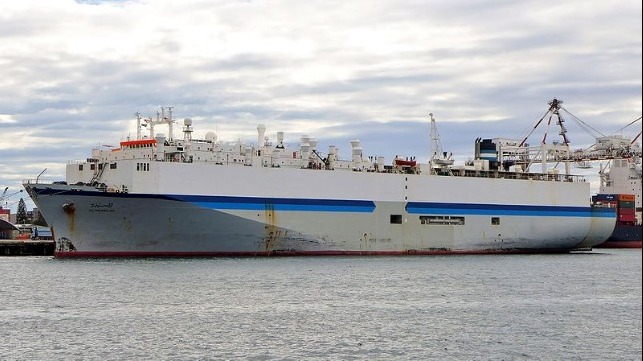Animal Rights Group Tries to Block Livestock Departing South Africa

The global debate on the live export of animals is again gaining attention as groups in South Africa have renewed their efforts to block the export of live sheep to the Middle East. In the past, other groups in Australia and New Zealand have bought similar battles, winning cases to limit but not stop the export. A livestock carrier issuing a distress call today off Japan during a typhoon has also brought attention to the issue of live export.
In August, a South African animal rights group went to court seeking an order to block the export of live sheep saying that the shipment of animals in hot, tight spaces created suffering and death for the animals. The Kuwait-based company denied the cruelty allegations citing its record of safely delivering animals. The company also said that its vessel had been further modified with improved ventilation systems to reduce the heat onboard.
Similar arguments of heat and stress to the animals lead to the Australians to conduct voyage inspections and track data on the animals’ condition and deaths during the voyages. Australia also introduced a seasonal ban on shipments to prevent the animals from being transported during the hottest periods of the year. The Australian regulations actually lead to the companies seeking new supplies of animals in South Africa.
After initially delaying the shipment, on August 25 the South African court issued an order permitting the Kuwaiti exporters, Al Mawashi and KLTT, to export up to 56,000 sheep on their vessel the Al Messilah. The Department of Agriculture, Land Reform and Rural Development was also told to monitor the loading process and provide reports to the court to ensure that the loading and export were being conducted humanely.
“We are devastated for the 56,000 sheep that will have to endure this treacherous journey, the undeniable cruelty that takes place on these voyages is simply unacceptable. We will not give up, we will continue to fight this. The Government will also be monitored closely; they have a very responsible task and are not above the law,” said Marcelle Meredith, Executive Director of the National Council of SPCAs (NSPCA) based in Johannesburg, South Africa.
The Al Messilah, which can carry up to 80,000 animals, was permitted to begin loading on August 30 with a permit for essential services for round the clock operations. The vessel is reportedly preparing to leave East London, South Africa, as soon as the weather conditions are favorable while NSPCA continues to fight the export, seeking additional court actions and making charges of harassment against the company and the crew of the ship.
For their part, the farmers and their associations have spoken out in favor of the animal export. They believe it could contribute to a recovery in their business and provide support for the local economy.
While the South African groups are continuing their fight over the ship due to sail and the broader issue, a New Zealand group named SAFE also issued a statement today repeating calls for the ban of live export. They linked their statements to the livestock carrier feared lost near Japan in a typhoon. Forty-two crew members are missing at last report from the ship, which was carrying 5,800 cows from New Zealand to China.
Citing the still unfolding situation in the East China Sea, Campaigns Manager Marianne Macdonald was quoted as saying, this tragedy demonstrates the risks in the live export trade. "This is a real crisis, and our thoughts are with the families of the 43 crew who are missing with the ship. But questions remain, including why this trade is allowed to continue. These cows should never have been at sea. To make matters worse they’re likely all pregnant."

that matters most
Get the latest maritime news delivered to your inbox daily.
Built in 1980, the vessel Al Messilah which is at the center of the controversy in South Africa has had several incidents in the Australia export trade. In 2017, the Australian Maritime Safety Authority stopped the livestock carrier from loading sheep in Fremantle after a port state control inspection found numerous problems with the vessel. In 2016, it was charged that the Al Messilah suffered a high mortality voyage where over 1,700 sheep died of heat exhaustion during a trip from Fremantle to the Persian Gulf. Before that, in 2011, the vessel suffered a mechanical breakdown shortly after leaving Adelaide and after nine days was forced to return to port.
The ongoing debates on the live export of animals are only likely to intensify as the animal rights groups work together to advance their calls for an end to export trade.
